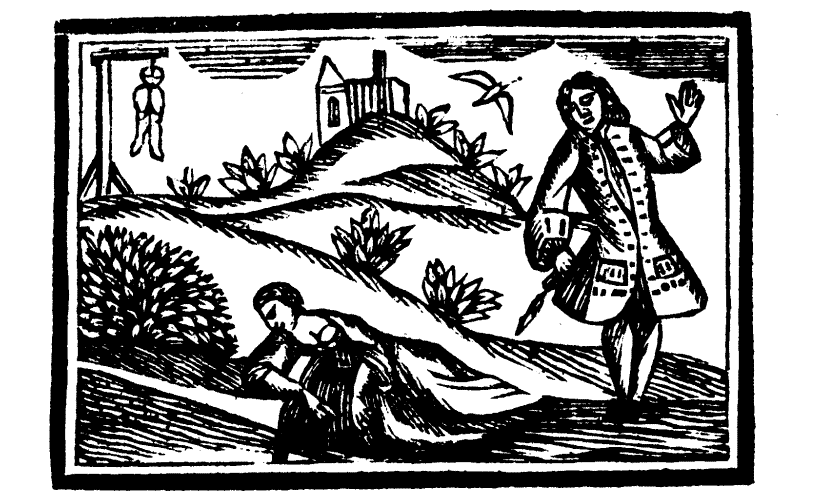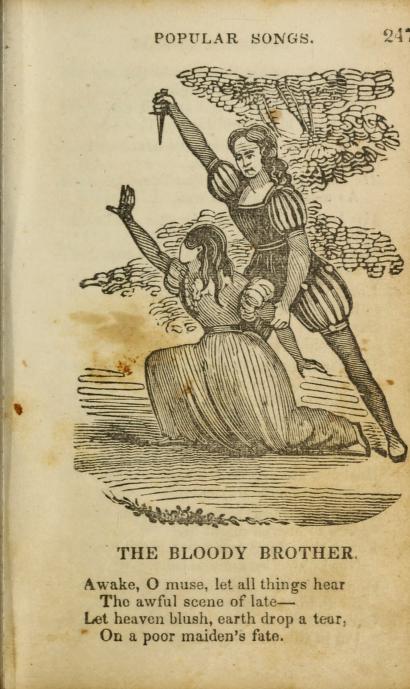No. 51: Lizie Wan
[Child does not mention the connection with Edward but certainly the endings are similar. In the US the two ballads are closely aligned. US versions of Lizie Wan use the "Testament ending" [Flanders AB 332] that is borrowed from Edward (or vice-versa). A little-known version, closely aligned with Edward, "Little Sister Mary" from Nora Hicks (North Carolina) is included in US and Canadian versions.
Child also does not mention that an adaptation of the theme of Lizie Wan titled "The Bloody Brother" appears in The-Forget-Me-Not Songster of c. 1840 in New York (see first page below).
The Bloody Brother was first printed as "The Leeds Tragedy, or, The Bloody Brother" in London circa 1750 (Barry BFSNE Vol. 7) and several reprints may be found from the early 1800s onward in the Bodelian library.

Woodcut of "The Leeds Tragedy, or, The Bloody Brother" Bodelian Library, 1800s
R. Matteson 2013]
CONTENTS:
1. Child's Narrative
2. Footnotes (There are no footnotes)
3. Brief (Kittredge)
4. Child's Ballad Texts A-B
5. Endnotes
ATTACHED PAGES (see left hand column):
1. Recordings & Info: Lizie Wan
A. Roud Number 234: Lizie Wan (Listings)
2. Sheet Music: Lizie Wan (Bronson's texts and some music examples)
3. US & Canadian Versions
4. English and Other Versions (Including Child versions A-B with additional notes)]

"The Bloody Brother" from The-Forget-Me-Not Songster 1840; New York
Child's Narrative
A. a. 'Lizie Wan,' Herd's Manuscripts, I, 151; II, 78.
b. Herd's Scottish Songs, 1776, I, 91.
B. 'Rosie Ann,' Motherwell's Manuscript, p, 398.
A, first printed in Herd's Scottish Songs, ed. 1776, is here given from his manuscript copy. B is now printed for the first time.
A is translated by Grundtvig, Engelskre og Skotske Folkeviser, No 50, who subjoins a Danish ballad, 'Liden Ellen og hendes Broder,' of similar character. Of this the editor had three versions, differing but little, and all of slight poetical value, and he prints one which was committed to writing some sixty or seventy years ago, with some readings from the others. Liden Jensen, having killed Liden Ellen in a wood, pretends to his mother that she has gone off with some knights. He is betrayed by blood on his clothes, confesses the truth, and is condemned to be burned. 'Herr Axel,' Arwidsson's Swedish collection, No 46, I, 308, under similar circumstances, kills Stolts Kirstin's two children, is asked by his mother why his hands are bloody, pretends to have slain a hind in the wood, and has his head struck off by order of his father.
'Herr Peder og hans Söster,' an unpublished Danish ballad, of which Grundtvig obtained a single traditional version, has also a slight resemblance to 'Lizie Wan.' Kirsten invites Sir Peter to her bed. He declines for various reasons, which she refutes. She discovers him to be her brother by her needle-work in his shirt. He draws his knife and stabs her. "This was also a pitiful sight, the twin children playing in the mother's bosom." Compare Kristensen, II, No 74 A, D, E, at the end.
The conclusion, A 11-12, B 10-17, resembles that of 'The Twa Brothers,' No 49, but is poetically much inferior.
Brief Description by George Lyman Kittredge
First printed in Herd's Scottish Songs, 1776, and here given from his manuscript.
Child Ballad Texts A-B
'Lizie Wan'- Version A Child 51
Herd's Manuscripts, I, 151; stanzas 1-6, II, p. 78. Herd's Scottish Songs, 1776, I, 91.
1 Lizie Wan sits at her father's bower-door,
Weeping and making a mane,
And by there came her father dear:
'What ails thee, Lizie Wan?'
2 'I ail, and I ail, dear father,' she said,
'And I'll tell you a reason for why;
There is a child between my twa sides,
Between my dear billy and I.'
3 Now Lizie Wan sits at her father's bower-door,
Sighing and making a mane,
And by there came her brother dear:
'What ails thee, Lizie Wan?'
4 'I ail, I ail, dear brither,' she said,
'And I'll tell you a reason for why;
There is a child bewteen my twa sides,
Between you, dear billy, and I.'
5 'And hast thou tald father and mother o that?
And hast thou tald sae o me?'
And he has drawn his gude braid sword,
That hung down by his knee.
6 And he has cutted aff Lizie Wan's head,
And her fair body in three,
And he's awa to his mothers bower,
And sair aghast was he.
7 'What ails thee, what ails thee, Geordy Wan?
What ails thee sae fast to rin?
For I see by thy ill colour
Some fallow's deed thou hast done.'
8 'Some fallow's deed I have done, mother,
And I pray you pardon me;
For I've cutted aff my greyhound's head;
He wadna rin for me.'
9 'Thy greyhound's bluid was never sae red,
O my son Geordy Wan!
For I see by thy ill colour
Some fallow's deed thou hast done.'
10 'Some fallow's deed I hae done, mother,
And I pray you pardon me;
For I hae cutted aff Lizie Wan's head
And her fair body in three.'
11 'O what wilt thou do when thy father comes hame,
O my son Geordy Wan?'
'I'll set my foot in a bottomless boat,
And swim to the sea-ground.'
12 'And when will thou come hame again,
O my son Geordy Wan?'
'The sun and the moon shall dance on the green
That night when I come hame.'
--------------
'Rosie Ann'- Version B Child 51; Lizie Wan
Motherwell's Manuscript, p. 398. From the recitation of Mrs. Storie, Lochwinnich.
1 Rosie she sat in her simmer bower,
Greitin and making grit mane,
When down by cam her father, saying,
What ails thee Rosie Ann?
2 'A deal, a deal, dear father,' she said,
'Great reason hae I to mane,
For there lyes a little babe in my side,
Between me and my brither John.'
3 Rosie she sat in her simmer bower,
Weeping and making great mane,
And wha cam doun but her mither dear,
Saying, What ails thee, Rosie Ann?
4 'A deal, a deal, dear mither,' she said,
'Great reason hae I to mane,
For there lyes a little babe in my side,
Between me and my brither John.'
5 Rosie she sat in her simmer bower,
Greiting and making great mane,
And wha came doun but her sister dear,
Saying, What ails thee, Rosie Ann?
6 'A deal, a deal, dear sister,' she said,
'Great reason hae I to mane,
For there lyes a little babe in my side,
Between me and my brither John.'
7 Rosie she sat in her simmer bower,
Weeping and making great mane,
And wha cam doun but her fause, fause brither,
Saying, What ails thee, Rosie Ann?
8 'A deal, a deal, dear brither,' she said,
'Great reason hae I to cry,
For there lyes a little babe in my side,
Between yoursell and I.'
9 'Weel ye hae tauld father, and ye hae tauld mither,
And ye hae tauld sister, a' three;'
Syne he pulled out his wee penknife,
And he cut her fair bodie in three.
10 'O what blude is that on the point o your knife,
Dear son, come tell to me?'
'It is my horse's, that I did kill,
Dear mother and fair ladie.'
11 'The blude o your horse was neer sae red,
Dear son, come tell to me:'
'It is my grandfather's, that I hae killed,
Dear mother and fair ladie.'
12 'The blude o your grandfather was neer sae fresh,
Dear son, come tell to me:'
'It is my sister's, that I did kill,
Dear mother and fair ladie.'
13 'What will ye do when your father comes hame,
Dear son, come tell to me?'
'I'll set my foot on yon shipboard,
And I hope she'll sail wi me.'
14 'What will ye do wi your bonny bonny young wife,
Dear son, come tell to me?'
'I'll set her foot on some other ship,
And I hope she'll follow me.'
15 'And what will ye do wi your wee son,
Dear son, come tell to me?'
'I'll leave him wi you, my dear mother,
To keep in remembrance of me.'
16 'What will ye do wi your houses and lands,
Dear son, come tell to me?'
'I'll leave them wi you, my dear mother,
To keep my own babie.'
17 'And whan will you return again,
Dear son, come tell to me?'
'When the sun and the mune meet on yon hill,
And I hope that'll neer be.'
End-Notes
B. Written without division into stanzas.